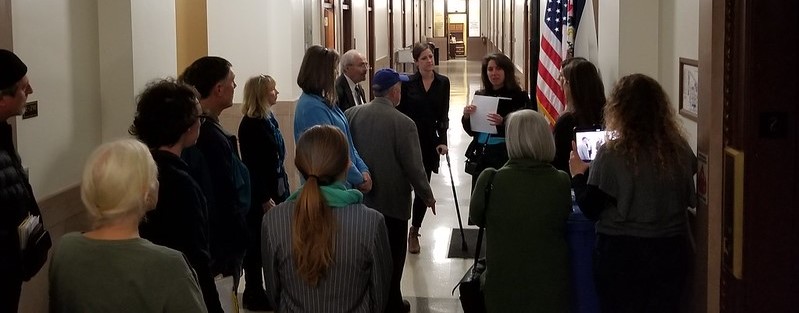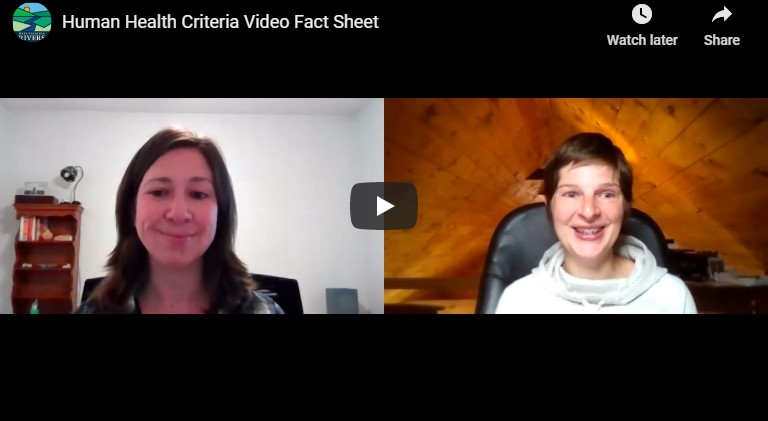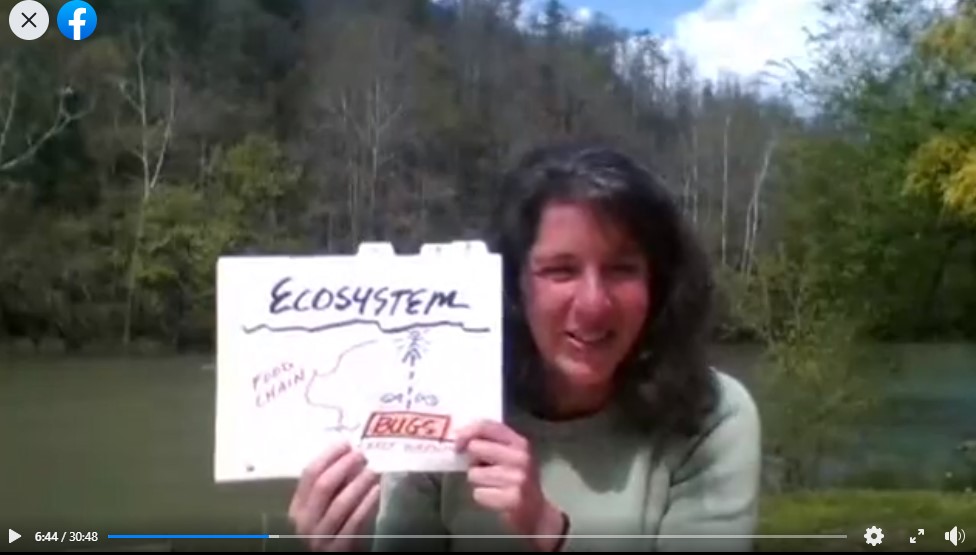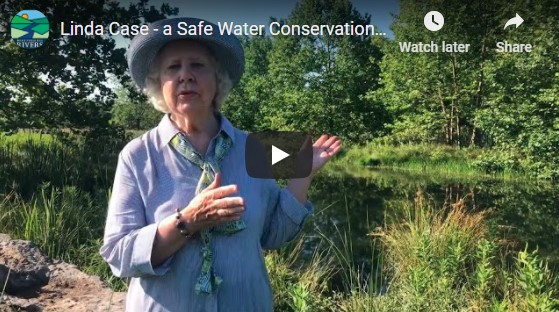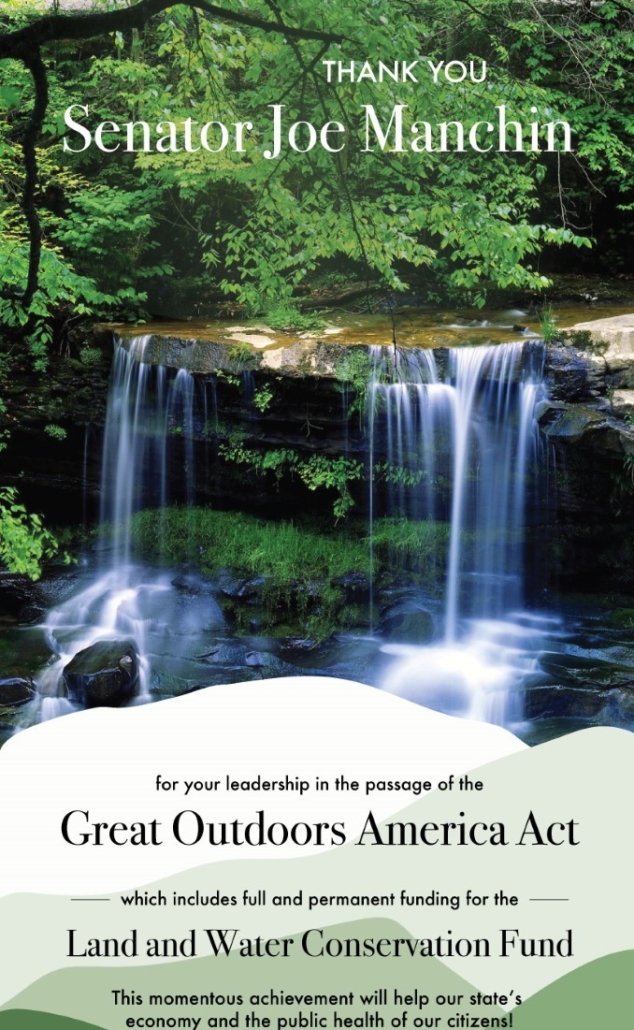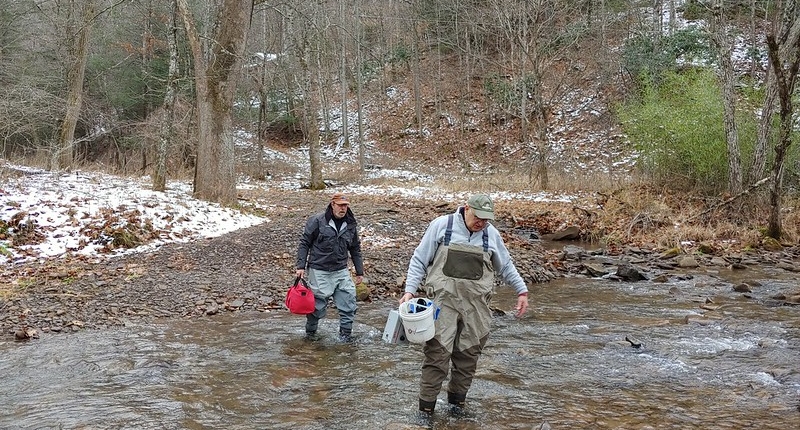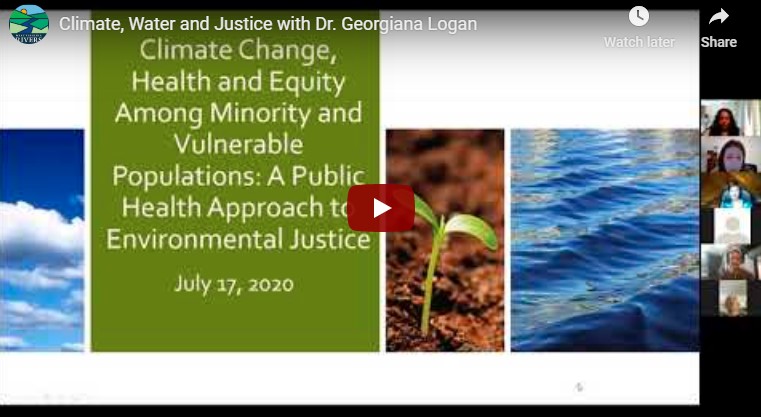WV Rivers Year in Review: Programs and Achievements
Water Policy
West Virginia Water Policy Workgroup. WV Rivers coordinated the Water Policy Workgroup comprised of policy and water issue experts who provide analysis and recommendations for coordinated policy response. During this grant period, the Water Policy Workgroup focused efforts on the 2020 legislative session and WVDEP proposed rules, including human health criteria and the biological assessment rule.
2020 Legislative Session. Overall, the 2020 session was relatively positive for water quality. We were successful in stopping several regressive bills from advancing. There are two policies that that particularly deserve highlighted in this report.
PFAS Study Resolution. We successfully mobilized to pass a study resolution, which takes an important first step identifying toxic polyfluoroalkyl substances, or PFAS, in West Virginia’s drinking water sources. Alarmingly, drinking water is a primary source of PFAS exposure. The study requires state agencies to sample raw water near all public drinking water intakes in West Virginia for the presence PFAS. Starting in 2021, the agencies must report the study findings to the Legislature on a semi-annual basis. The data collected during the study will inform the next steps to address PFAS contamination. The resolution’s passage was largely due WV Rivers’ public education and advocacy campaign which engaged 1,770 individuals in generating 20,810 citizen letters to decision-makers on PFAS concerns.
Led by WV Rivers’ executive director, Angie Rosser, citizen advocates deliver a petition to the chair of the House Health and Human Resources Committee in February requesting the addition of PFAS legislation to the committee’s agenda.
Aboveground Storage Tanks Rollback. The 2020 session started off with the introduction of a contentious bill that would exempt oil and gas tanks within drinking water zones of critical concern (ZCCs) from the Aboveground Storage Tank Act (ASTA). WV Rivers and members of the Water Policy Workgroup coordinated an education campaign generating over 21,000 messages to legislators which effectively stalled the bill in committee. In fact, the bill never made it on to the committee agenda even though the lead sponsors were chairs of the committee. Angie Rosser appeared on the West Virginia Public Broadcasting program “The Legislature Today” to discuss rollbacks to the ASTA. Watch the recording. The segment begins at 12 minutes into the program.
Triennial Review of Water Quality Standards. Participation in the triennial review of our state water quality standards – the standards that set limits on the amount of pollution allowed in our rivers and streams – is one of the most important activities we undertake, and no other group does it in West Virginia. Participation in this process was a key activity of the project.
Human Health Criteria. During the 2019 legislative session, members of the legislature decided to delay adoption of updated human health criteria within water quality standards until 2021, with important milestones along the way. Throughout this grant period, the Water Policy Workgroup remained focused on providing scientifically-sound analysis and public education on human health criteria.
In March, WVDEP released for public comment their revised proposal to update human health criteria. While WVDEP partially adopted recommendations previously made by the Water Policy Workgroup, their proposal was aligned with the interests of the chemical manufacturers.
With to the COVID-19 stay-at-home order, WV Rivers encouraged WVDEP to host a virtual public hearing to replace the in-person hearing on their proposal. Garnering public participation in this virtual hearing was central to our outreach strategy. The virtual hearing was well attended with 75 participants, previous hearings related to water quality standards generally hosted less than a dozen individuals.
We provided video (pictured above) and written citizen fact sheets and helped 665 citizens provide individual comments. We also developed technical written comments with 18 organizational sign-ons, and delivered testimony at the public hearing.
In late June, the WVDEP released their final revised human health criteria which goes before the 2021 Legislature. In their final rule, WVDEP chose again to align their decision with the requests of the WV Manufacturers Association to only update a subset of criteria with an exception – they adopted our recommended fish consumption rate, based on the best available science – a significant victory. Additionally, WVDEP decided to convene a “workgroup” to study the remaining criteria. WV Rivers was the only environmental group invited on the workgroup, so we have a big weight on our shoulders to stay engaged.
In September, the Legislative Rule-Making Review Committee had prepared to discuss WVDEP’s proposed rule in preparation for the 2021 session. WV Rivers notified the public of this meeting and in less than 48 hours, our action alert generated 336 messages to committee members. The committee chair removed the water rule from the agenda, no doubt in response to public scrutiny.
Human Health Criteria Facebook Live chat
Human Health Criteria Video Factsheet
Biological Assessment Rule. Another significant rule developed during this reporting period was the biological assessment rule, which involves revisions to the methodology used to determine if stream life meets the state’s narrative water quality standards. Our analysis of the rule resulted in the recommendation for WVDEP to use a precise assessment tool. We submitted technical comments with 13 partner sign-ons requesting use of a genus-level assessment and the elimination of a proposed “zone of uncertainty” which would wrongly leave 23% of our assessed streams as neither impaired nor as meeting WV’s water quality standards.
We again leaned on digital technology to engage the public in the comment process. We developed a video factsheet and hosted a Facebook Live question and answer session (pictured right) which has been viewed over 1,400 times. Our efforts engaged 170 citizens in submitting individual comments.
Biological Assessment Rule video factsheet
Biological Assessment Rule Facebook Live question and answer session
Additional notable policy activities:
- Small Sewage Disposal Systems. This general blanket permit is reissued every five years and currently regulates the discharge for approximately 775 sewage treatment facilities throughout the state. We submitted technical comments with 4 organizational sign-ons urging WVDEP to revise the general permit to increase the monitoring frequency to demonstrate compliance. We also facilitated public comments though our advocacy tool, generating 119 comments.
- Multi-Sector General Stormwater Permit. This general permits covers around 1300 industrial facilities to set controls on their polluted run-off. We submitted technical comments with 6 organizational sign-ons and facilitated 353 public comments through our advocacy tool.
- Wetland Rapid Assessment Methodology. This methodology helps to make sure the state is adequately identifying wetlands and protecting them from development activities. We submitted technical comments with 3 partners signing-on.
Safe Water for West Virginia
Our Safe Water for WV program promotes the protection of drinking water supplies by equipping citizens to take an active role local source water protection efforts, and to assist water utilities in implementing source water protection plans.
Outreach and Education. We participated in several outreach and educational activities throughout the course of the grant in pilot project locations. Highlighted activities include:
- We assisted in the creation of water bill inserts for the public water utility in Harpers Ferry. The insert provided information on source water protection and reached 800 customers.
- We piloted school-based source water education series in partnership with Potomac Valley Audubon Society. Due to COVID-19, the project became a video series and educational videos and materials were distributed to science teachers.
- The COVID-19 pandemic inspired a blog series titled “Peace in Nature”. The series included 10 long-form blogs linking popular outdoor recreation locations with source water protection. Blogs are here.
- We provided technical assistance to the Tuscarora Creek Project Team in Martinsburg as they developed their watershed based plan to highlight the overlap between watershed based plans and source water protection planning.
- We worked with local partners to host a week-long Buckhannon RiverFest in August in a virtual format (using Zoom and Facebook).
- The event featured daily activities and included a video tour of the Buckhannon water utility treatment process, a discussion with city representatives about stormwater and efforts to reduce pollution, a Water Quality Roundtable discussion with 9 panelists, and a variety of kids’ activities. There were 101 people pre-registered for all events, and 1,870 views on Facebook Live.
Septic Pumping. This innovative pilot project brought together the local Conservation District, a private septic company, and WV Rivers to address bacteria problems in the Elks Run Watershed. The project included outreach to 474 homeowners in a strategic source water protection area with an educational postcard offering free septic pumping. Twenty-two septic tanks were pumped in the watershed. Additionally through the project, 19 homeowners were connected with their local watershed organization. Read about the project here.
Safe Water Conservation Collaborative. This initiative prioritizes land conservation as a powerful permanent source water protection and pollution reduction strategy. This conservation model is being piloted in Jefferson and Berkeley Counties. Activities included:
- Development of a “Landowner Legacy” video series that highlights landowners conserving their land for drinking water protection. Pictured right is one of the participants in the video series. Videos can be viewed here.
- Mailings of letters and postcards to targeted landowners in priority areas to provide education on land conservation for source water protection, and invite landowners to initiate conversation on conservation options available to them.
- Development of a Best Management Practices Toolkit for land conservation to protect water. View it here.
Public Lands and WV Headwaters Advocacy
Our public lands campaign to protect headwater streams and promote recreational access continued its multi-faceted approach including grassroots actions, business influence, and broad partnerships to achieve protective policies and enhanced access to public lands. WV Rivers coordinates these facets through leading the West Virginians for Public Lands alliance (WVPL). During this grant period, we hired Sarah Cross (pictured left) as campaign coordinator to spearhead the facilitation of our public lands programming.
Great American Outdoors Act. During this reporting period, we celebrated the culmination of years of advocacy with the passage of the Great American Outdoors Act (GAOA) that touts Senator Manchin as a lead sponsor. The historic conservation bill includes permanent full funding for the Land and Water Conservation Fund. Since LWCF was first enacted in 1964, it rarely received full funding through the appropriation process. Now, LWCF will receive its full $900 million budget on a yearly basis, which could mean double the amounts of money into West Virginia for conservation projects. Additionally, the Act provides essential funding – $9.5 billion over five years – to begin addressing the maintenance backlog plaguing our public lands.
We are especially proud to acknowledged that all of West Virginia’s congressional delegation sponsored or co-sponsored the Great American Outdoors Act.
Their leadership on the Act is a testament to the effective advocacy of WV Rivers and the West Virginians for Public Lands alliance. During this grant period, efforts to push the Great American Outdoors Act across the finish line included:
- Three digital advocacy campaigns on the GAOA generating 1,669 messages to West Virginia’s congressional delegation.
- Two congressional visits with citizen advocates speaking in favor of the GAOA.
- Ten original media placements including 2 on camera interviews that were broadcast on 6 additional news outlets.
- A post-GAOA passage thank you campaign which included a sign-on letter with over 100 signers, and full-page ads thanking Senator Manchin for his leadership.
- After the Act’s passage, Angie Rosser was invited to speak on the GAOA during a press conference hosted by Senator Manchin.
National Environmental Policy Act. We coordinated a public education and action campaign on rollbacks to the National Environmental Policy Act (NEPA), an important program that provides opportunities for public comment and engagement on federal permits and policy. In West Virginia, NEPA is especially important because of the large amount of federal public lands – 1,130,952 acres. We submitted technical comments with 13 partner sign-ons and generated 307 individual comments on the proposed rollback.
New River Gorge Park and Preserve. The New River, which at its confluence with the Gauley River forms the Kanawha River, could see changes to its National Park unit designation. Bills were introduced that would re-designate the New River National River as a New River National Park and Preserve. In February, the Senate Energy and Natural Resources Committee held a field hearing in WV to hear from local residents on the proposal. WV Rivers staff and members provided testimony highlighting the need to ensure environmental integrity with the projected increase in visitation.
The PEOPLE Act of 2020. In late October, we coordinated a public education and advocacy campaign on the PEOPLE Act of 2020, a new bill that would ensure transparency and public participation in oil and gas exploration decisions on public lands. We developed organizational sign-on letters requesting our support for the Act and a campaign in our digital advocacy tool for citizens to contact WV’s Senators. As of this report, 150 of our supporters have taken action on this issue.
Additional public lands and headwaters protection highlights:
- Participated in Monongahela National Forest strategic planning session involving outlook and processes for forest management and NEPA projects.
- Submitted comments to the USFS on the Monongahela National Forest’s Greenbrier Southeast Project Environmental Assessment, Grassy Ridge Environmental Assessment, and Upper Elk Restoration projects.
- Submitted comments on WVDNR’s Draft R3 Plan to increase outdoor recreation in the state, focusing on Angling, Boating, and Wildlife Viewing goals.
- We are currently participating in the state’s development of a Statewide Comprehensive Outdoor Recreation Plan (SCORP). This will be a guidance document for statewide LWCF investments and will go into effect in April 2021.
Citizen Oversight and Regulatory Advisory Program
This was an active year for our pipeline oversight program and we saw the results of our efforts to enforce permit requirements at the state and federal level. In July, ACP developers announced the cancellation of the project. In the immediate outlook, this a reprieve for the 491 stream segments that were slated to be crossed by the pipeline. However, clearing and trenching was already underway in WV before cancelation, and are monitoring reclamation of those disturbed areas especially along steep slopes surrounding headwater streams. We are also still closely monitoring the Mountain Valley Pipeline as court and agency decisions related to its ability to resume construction unfold. Highlighted activities this grant period include:
- With our partner Trout Unlimited, we published a new report titled Reducing Impacts of Pipelines Crossing Rivers and Streams. This report was shared with the WVDEP’s Environmental Protection Advisory Council as well as the public.
- We co-led the WV Wild Trout Collaborative, an interagency and community partnership advancing documentation/mapping and protective management of WV’s trout streams.
- We continued coordination of our volunteer water quality monitoring program. During this reporting period, 285 sampling trips were completed. Our volunteers have conducted over 6,800 sampling trips since the program began in 2013. This has resulted in over 74,000 measurements at 564 sites in WV and VA. Three eDNA sampling trips were conducted with volunteer monitors to identify undocumented trout streams. The sampling trips resulting in 26 eDNA samples and results are expected in late fall 2020.
- This year to date we have submitted 12 citizen complaints to WVDEP detailing erosion and stabilization issues on the Stonewall Gathering Line and Mountain Valley Pipeline, sedimentation in a stream from agricultural operations, a stream potentially impacted by fracking wastewater, and a stream impacted by mine portal discharge. The WVDEP Inspectors followed-up with a site inspection and issued violations in some areas and warnings at other sites.
Our volunteers out in the field taking water quality and eDNA samples.
Climate Action Campaign
In 2020 we further developed a campaign centered on WV-specific climate change education and advocacy. Like all of our programming, this campaign is rooted in a collaborative approach that provides science-based information and solutions in a way that is understood by the public and decision-makers.
Climate Education. Over the summer, we produced a successful webinar series titled “Climate and Water in WV” which featured West Virginia based-scientists on the cutting edge of climate science. The webinars were attended by approximately 350 people during the live presentations, and the recordings were subsequently viewed over 2,000 times. Below are the scientists featured in the WV Climate and Water webinar series. The webinars can be viewed on our climate resource page here.
- Dr. Than Hitt, a fish biologist with the USGS Leetown Science Center in Kearneysville WV, discussed his research on trout population and community ecology in Appalachia.
- Dr. Omar Abdul Aziz, an Associate Professor of Civil & Environmental Engineering at West Virginia University, presented his work on weather related climate impacts.
- Dr. Nicolas Zégre, the Director of the Mountain Hydrology Laboratory at West Virginia University, shared his research on water security and climate change in West Virginia.
- Dr. Georgiana Logan, an assistant professor of health science and a research associate for the Minority Heath Institute at Marshall University, discussed the history of environmental justice in public health; the Minority Health Institute’s current research and programs; and highlighted the work of students on climate change and environmental justice.
Presentation by Georgiana Logan of Marshall University on the intersection of climate change and social justice.
Building a Climate Movement. Collaboration is the key factor in our work to build a statewide and regional movement to act on climate. We provided leadership on two new important collaborative initiatives this grant period to meet the climate challenge in West Virginia.
ReImagine Appalachia. We are a founding member of a broad and inclusive coalition of organizations and individuals working together across WV, KY, OH and PA to create and an economic future for our region that creates sustainable, well-paying jobs and positions the Ohio Valley at the forefront of addressing climate change. We co-led the Outreach & Engagement workgroup with the WV Center on Budget & Policy, and to date helped garner 100 organizational endorsements of the campaign’s policy blueprint. We also worked with the Center to educate WV’s elected and candidates about the blueprint, as well as led and participated in multiple outreach and media events. Check out more about the campaign at ReimagineAppalachia.org.
WV Climate Alliance and Citizen’s Guide to Climate Change. Much of the climate conversation focuses on impacts and issues that many West Virginians find challenging to relate to their everyday lives. That’s why we joined allied organizations throughout the state to begin the formation of the WV Climate Alliance, a coalition of environmental, faith-based, and social justice organizations coming together to provide public education to West Virginians on climate change. In September, the WV Climate Alliance published and held a virtual press conference announcing the release of the “A Citizen’s Guide to Climate Change”, an easy-to-read report that explains the science behind climate change, the impacts West Virginia is likely to experience, and potential solutions.
Other highlights of our climate education and movement building included:
- Raised the profile of climate science in the West Virginia media. Over the reporting period we were successful in receiving 12 climate related media hits; including 5 LTE’s, 3 op-eds, and 4 non-opinion placements. We also participated in 5 reporter education meetings on climate science.
- Participated in 5 lobbying visits with Senator Manchin. We discussed the importance of prioritizing climate legislation in his leadership role on the Senate Energy Committee.
- Presented at the virtual WV Science Teacher Association Conference. We co-presented a workshop called Kitchen Climate Science, 34 educators attended.
- Partnered with the WV Center on Climate Change for a webinar titled “Climate Generations” which examined generational perspectives on the climate crisis. Over 150 people registered.
- Partnered with Solar United Neighbors to establish a solar co-op in Southern West Virginia. In a kickoff webinar, we presented information on climate change impacts in West Virginia.
- Served as a member of the WVDNR Trout Management Plan stakeholder advisory committee. In this role we advocate for climate change mitigation to be included in trout management plans.
- Provided mini-grants for climate education to Mid-Ohio Valley Climate Action and WV Interfaith Power & Light.
Sharing Our Clean Water Message
This year, our email newsletters, which are designed for different interest groups – like water policy, public lands, pipelines, and watershed organizations – reached 7,230 individuals through 134 publications, a 12% increase since this time last year. Our digital advocacy campaigns generated over 54,650 messages from citizen activists to decision-makers on water policy. That’s a 17% increase over last year in the number messages sent by advocates. We are extremely fortunate that we already had in place the tools needed to keep our supporters engaged and active throughout the stay-at-home order. Because of past investments made to our communications and advocacy tools, we were able to grow our advocate base even during the pandemic.
Our website, WVRivers.org, houses our blog of up-to-date water quality news, reports, factsheets and other publications. This year so far it was viewed over 23,000 times by 18,000 users. Our social media, an important pipeline for new supporters to learn about WV Rivers and our programs, increased its reach by 5%.
This year, we offered supporters 21 diverse advocacy campaigns and we submitted technical comments on 13 permits and water policies. All of our advocacy campaigns include the production educational materials designed for the public and decision-makers to learn about the issues.
Incorporating the use of recorded videos and video conferencing into our outreach strategy was critical to engaging citizen advocates in the midst of the pandemic. We intend to continue to use video as an outreach tool within our programming moving forward.
Notable Accomplishments
Beyond the volume and breadth of our reach, one of the proudest moments of the year was the West Virginia’s congressional delegation’s leadership on the Great American Outdoors Act. It is a true testament to efficacy of our advocacy strategy. While the policy win in itself is a major accomplishment, seeing our advocacy strategy achieve the desired results – and knowing that our strategy is replicable – is perhaps even more rewarding. On the state level, even in an environmentally hostile legislature, we also are very proud of our accomplishments in beating back industry-led efforts to rollback or exempt protections; making progress on addressing PFAS pollution; and keeping the pressure on updating human health criteria.

